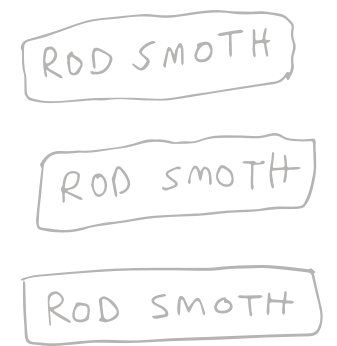Bio
The song “Almost See” by Rod Smoth begins like this: “It's like painting a portrait/Except every passing stroke disappears the moment after it is drawn/But you believe it’s still there.” As far as aesthetics go, this is a pretty strong mission statement. The song moves at a lazy drawl, quiet but intense, with an air of menace at its fringes. At the chorus, the song seems to slow down, becoming heavier, more deliberate, as the harmonies come in: “And at the end you know if you really stare/You can almost see it's a masterpiece.”
Rod Smoth is the project of Mississippi singer and guitarist Reed Smith. Raised in a family of southern gospel singers, Smith first picked up the guitar when he was eight years old. He began playing music with his family and graduated to heavier music in his teens, playing with various bands across the diverse and fertile Jackson, Mississippi music scene. Smith attended college in the Mississippi Delta, and eventually found himself with an internship in Nashville, sleeping on a friend’s couch. It was here that he picked up an acoustic guitar, fingerpicking and singing quietly so as not to bother his roommates. These limitations gave Smith the perfect outlet for his musical vision. By combining the eerie quiet of folk music with the darkness of stoner rock, Rod Smoth was born.
Rod Smoth’s self-titled debut was recorded in producer Cole Furlow’s (Low Variety, Dead Gaze) home studio above a bar in downtown Jackson, Mississippi. Jesse Coppenbarger (Colour Revolt, El Obo) played bass and sang background vocals, while Logan Owensby sang and played drums and Jacob Lifsey handled synths and programming. The album was tracked live, with bass, drums, guitars, and the lead vocal recorded together in a tailgating tent constructed in Furlow’s studio.
“We had to build a live room to keep the sound under control,” says Smith. “We wound up with this big tent that people used for tailgating football games, and we just threw it up in the studio and draped blankets over it. The whole thing was kind of spooky.” The bulk of the songs were recorded over three live sessions in three days, with Smith and Furlow tinkering on the songs for several months afterwards.
The record details the final days of a relationship, and the aftermath of the eventual collapse. “I wanted the lyrics to be personal but I tried to keep them nonspecific enough to be relatable,” says Smith. “I want people to read themselves into the songs.” Smith’s voice is deep and soulful, a kind of darkened croon. The music is mysterious but accessible, heavy but never quite hopeless.
“Dark Hall” is a song of wandering. The music is hazy and forbidding, the drums at a slow but insistent beat. The music has elements of the sludgy stoner darkness of bands like Earth and True Widow, but a gentler, quieter take. “If there’s no room at the end of this dark hall,” sings Smith, “I'll spend the rest of the day in this anxious walk. No more light at the edges since long ago. No more voice in the silence for me to follow.” It’s a song about seeing the path you have to walk, but being terrified at what might or might not be waiting in the end.
“Too Close” is an upbeat and searching song. The drums move on at a steady clip as the lyrics detail the way two people get to know each other better and better. There’s a danger with any kind of closeness, the risk of being hurt. “How close is too close?” sings Smith. “I wish we could find out.” It’s set in one of Smith’s poppiest and most direct melodies. The song thrums with equal parts hope and fear, a longing for resolution but also a sense of worry as to what that resolution might be.
Album highlight “Island” at first feels like a reprieve from all the darkness. The song begins with a statement of hope: “Can't say what I'd rather do/Than be walking on a day like this with you Look so right to everyone passing through.” For the chorus, Smith undercuts all that joy. “But honey I’m scared that we’re on the island.” The narrator realizes this happy, ideal time can’t last in the real world, that it requires an isolated, unreal place in which to thrive. With backing vocals curtesy of Schaefer Llana, the song is the heartbeat of the record, filled with the tension between the desire for hope and the fear of heartbreak.
“All of these songs are about truth in some sense,” says Smith, “about how the truth can be just as destructive a force as lies. I tried to go inward and be vulnerable in a way that I never have before. Because there’s a lot of freedom in vulnerability, in being open like that.” Smith stops himself, laughing a little. “As long as it’s not too open, of course. You always have to keep the mystery.”
